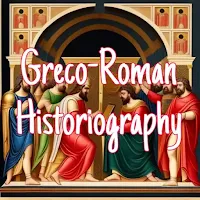Describe the nature and characteristics of Greco-Roman Historiography.
Describe the nature and characteristics of Greco-Roman Historiography.
Greco-Roman historiography refers to the tradition of historical writing that emerged in ancient Greece and Rome. It is characterized by several key features and principles that distinguish it from other forms of historical writing.
Greco-Roman historiography focused heavily on recounting events in a chronological and narrative fashion. Historians such as Herodotus and Thucydides in Greece, and Livy and Tacitus in Rome, crafted their works as compelling stories rather than mere records of facts.
| Characteristic | Description |
|---|---|
| Narrative Emphasis | Focus on storytelling and chronological order. |
| Use of Sources | Reliance on oral accounts, documents, and earlier works. |
| Interpretation and Analysis | Seeking causes and consequences of historical events. |
| Rhetorical Flourishes | Employment of persuasive techniques and literary devices. |
| Moral and Political Lessons | Extraction of guidance from historical examples. |
| Accuracy | Valuing factual detail while sometimes embellishing. |
| Contextualization | Situating events within broader historical contexts. |
| Influence | Shaping Western historiographical traditions. |
Use of Sources
Historians in this tradition often relied on a variety of sources, including oral accounts, official documents, and earlier historical works. They frequently incorporated speeches, letters, and other primary sources into their narratives to provide multiple perspectives on events.
Interpretation and Analysis
Greco-Roman historians were not simply chroniclers of events; they also sought to interpret and analyze the causes and consequences of historical developments. Thucydides, for example, famously emphasized the role of human nature and power politics in shaping history.
Rhetorical Flourishes
Historians in this tradition often employed rhetorical techniques to enhance the persuasiveness and impact of their narratives. They crafted vivid descriptions, employed literary devices, and used rhetoric to persuade readers of their interpretations of events.
Moral and Political Lessons
Many Greco-Roman historians aimed to extract moral and political lessons from history. They used historical examples to illustrate virtues and vices, to offer guidance to contemporary statesmen, and to warn against repeating past mistakes.
Concern for Accuracy
While Greco-Roman historians sometimes embellished or dramatized their narratives for rhetorical effect, they also valued accuracy and factual detail. They often conducted extensive research and sought to verify their accounts through cross-referencing and corroboration.
Historical Context
Greco-Roman historians typically situated their narratives within broader historical contexts. They explored the social, political, and cultural factors that influenced events and sought to convey the complexities of historical developments.
Historiographical Tradition
Greco-Roman historiography built upon earlier traditions of historical writing, including Greek epic poetry, mythological accounts, and annalistic records. It, in turn, influenced later historical writing in the Western tradition, shaping the methods and conventions of the discipline.
Overall, Greco-Roman historiography represents a rich and diverse tradition of historical writing characterized by its narrative skill, interpretative depth, rhetorical sophistication, and enduring influence on the study of history.
FAQ Facts:
Q: What is Greco-Roman historiography?
A: Greco-Roman historiography refers to the tradition of historical writing that emerged in ancient Greece and Rome, characterized by narrative storytelling and analysis of historical events.
Q: What are the key characteristics of Greco-Roman historiography?
A: Key characteristics include narrative emphasis, use of diverse sources, interpretation and analysis of events, rhetorical techniques, moral and political lessons, concern for accuracy, contextualization, and influence on later historiographical traditions.
Q: Who were some prominent Greco-Roman historians?
A: Notable historians include Herodotus and Thucydides in Greece, and Livy and Tacitus in Rome, whose works continue to shape the study of history.
Q: How did Greco-Roman historians approach historical accuracy?
A: While they sometimes embellished for rhetorical effect, they also valued accuracy and conducted extensive research to verify their accounts through cross-referencing and corroboration.
Q: What influence did Greco-Roman historiography have on later traditions?
A: It profoundly influenced Western historiography, shaping methods, conventions, and the understanding of history's moral, political, and cultural dimensions.
Q: How did Greco-Roman historians convey historical context?
A: They situated events within broader social, political, and cultural contexts, exploring the factors that influenced historical developments and providing a nuanced understanding of the past.
